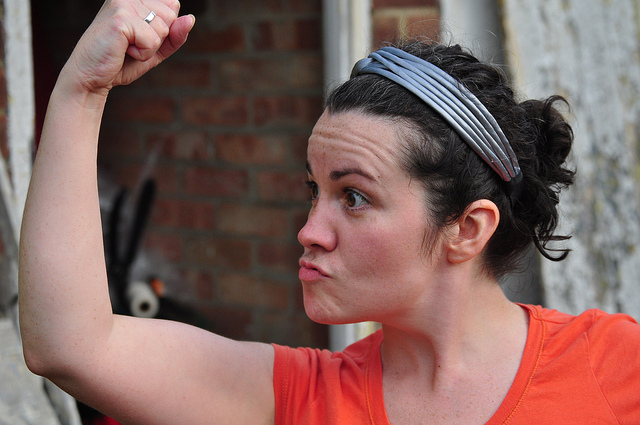
Understanding Strength and Weakness
We like to believe we are strong people.
Some of us are physically strong, while others focus on mental toughness. We appreciate our emotional strength, our spiritual strength, or how much stronger we are becoming.
Building strength and overcoming weakness are important to us. We take tests to find our strengths and measure how strong they are. Strength helps us do things while weakness makes it harder to get things done.
It is usually more polite, and more helpful, to point out someone’s strengths than their weaknesses.
Most of us see strength and weakness as opposites. We believe in a gradual scale with strength on one end and weakness on the other.
It is usually easy for us to tell the differences between strength and weakness. We want to be strong and few of us desire being weak.
It is as if we see ourselves as a chart with bars for all of our qualities and characteristics. The bars for our strengths are above the line while the bars for weaknesses are below it.
Some of us live as though we are trying to get as many of those bars above the line as we can.
I see strength and weakness differently. It has become more and more challenging for me to differentiate between strength and weakness. I am starting to conclude we assess weaknesses and strengths based on how we see them.
There are qualities I tend to see as weaknesses which other people experience as strengths. Some traits which I see as great strengths other people view as significant weaknesses.
More and more, I see assessing people’s weaknesses and strengths says more about me than it does about them.
What do we think makes us strong? Which qualities weaken us?
What is a Strength and What is a Weakness?
Is persistence a strength while stubbornness is a weakness? Do you see patience as a strength and reluctance to take action as a weakness?
How do we decide whether a trait or characteristic is a weakness or a strength?
I took one test which told me being focused is one of my strongest strengths. It is right up there along with being strategic and analytical.
Being able to concentrate and focus my attention has served me well. It helped me do well in school and in practicing law.
There are times, though, when being focused can act like a weakness. I miss things when I am busy concentrating on something else. It is possible for me to be so attentive to what I am reading I do not hear what someone says to me. I may be so focused on figuring out a solution to a problem I lose track of time.
My ability to focus can also get in the way when more unfocused attention might help. Listening to someone with a lot of focus can make them feel like they are being interrogated. Cross-examination is not the impression you want to give someone when you are asking them to trust you.
Having the ability to do something well can be a helpful strength. We may be able to accomplish things other people cannot or more easily than they can. The challenge is any trait we identify as a strength may be perceived by someone else as a weakness.
There is a fine line, or no line, between strength and weakness.
The key is appreciating the subtle balance inherent in all our qualities. When we rely too much on a particular characteristic, a potential strength may become a weakness.
Monastic Strength and Weakness
Monks are some of the strongest people I know.
It is not how much weight they can lift or how far they can run which makes them strong. Their deep strength comes from how they approach themselves and the world around them.
The monks who inspire me lead by example and by asking insightful questions. Many of them translate the time they spend in reflection into open-ended questions.
Monks share stories. They have shared their own stories with me and listened to mine. Monks also tend to be adept at telling stories which illustrate a particular point.
Monastic leadership is about sharing stories. We each share our own stories and they come together to form our story. Each of us plays our part and the story comes together around us. No matter how we see our own strengths or weaknesses, the story fits together.
We share the stories of our past and they come together to create our present. Our future stories grow out of the stories we share.
The stories monks have told me feed my own reflection. As I listen and reflect, I begin to see myself, and other people, differently, in new ways. Qualities I thought were weakness may be revealed to be strengths.
Reflecting on Strength and Weakness
We tend to rush into evaluating and assessing strength and weakness. It can be easy for us to miss how our qualities combine in our true selves.
We work hard to fit other people’s expectations and definitions of a strong person. Our deepest strength grows from how well we know our deepest selves. As much as we try to make ourselves stronger by pretending to be someone else, we are not.
We often need to be truly strong to build a relationship with life as it is. As we grow, we set aside the masks we have developed to hide our weaknesses. We work through the layers of protection we have constructed to find who we truly are.
We move beyond worrying about whether our qualities are strengths or weakness. As we get to know ourselves well, we come to see our evaluation does not make a difference.
We are a unique balance of strength and weakness. Ready to share our stories, we contribute to the story we all share.
What is your greatest strength, and your greatest weakness?
How will you tell the difference between strength and weakness this week?
[Image by smashmirrorcardboardface]
Greg Richardson is a spiritual life mentor and leadership coach in Southern California. He is a recovering attorney and university professor, and a lay Oblate with New Camaldoli Hermitage near Big Sur, California. Greg’s website is StrategicMonk.com, and his email address is [email protected].












